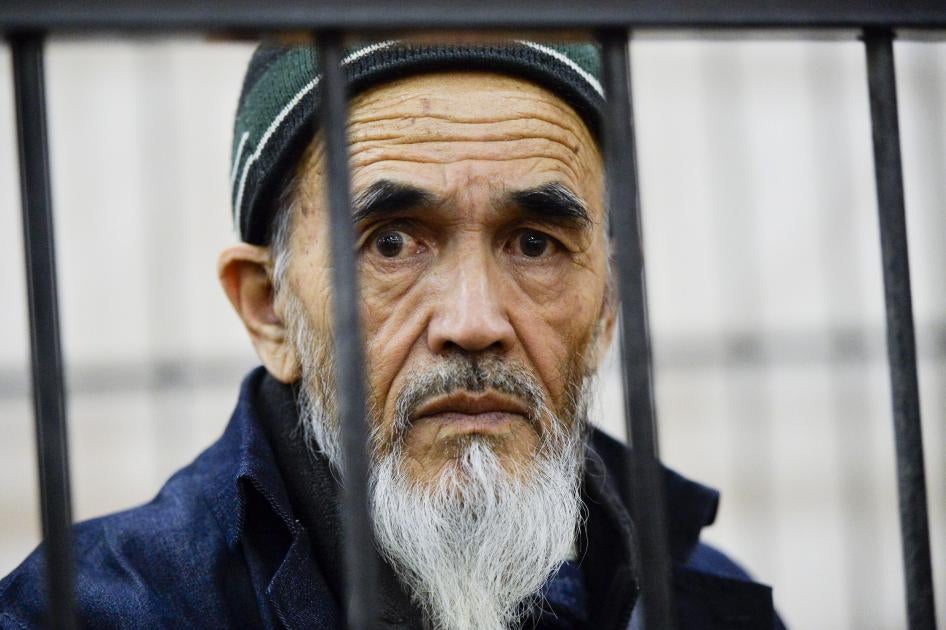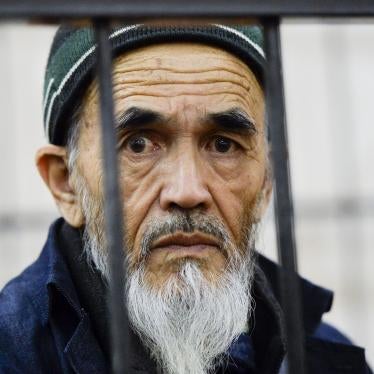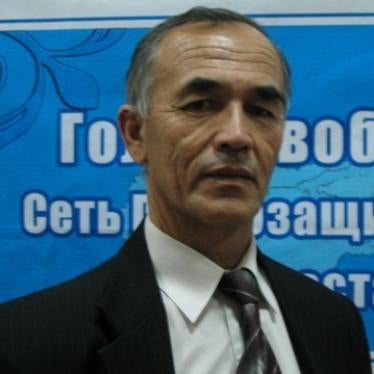Azimjon Askarov, a human rights defender from Kyrgyzstan, may have died in prison on Saturday after contracting pneumonia, but it really was the cruel human rights abuses that ultimately got him. Prison officials confirmed the cause of death, but we must be very clear: What killed Askarov was 10 years of human rights violations compounded by cowardice, cruelty and negligence on the part of Kyrgyz authorities.
Askarov, a member of the ethnic Uzbek minority in Kyrgyzstan, was 69 years old. Before he was jailed, he documented and reported on police abuse of detainees and prison conditions in his hometown of Bazar-Korgon, in southern Kyrgyzstan. He was also a journalist, a talented artist, a husband, father and grandfather.
Askarov maintained his innocence to the day he died.
Police arrested Askarov in June 2010 in connection with the killing of a police officer in Bazar-Korgon, a few days after ethnic violence — which disproportionately affected ethnic Uzbeks — left hundreds dead and thousands displaced in southern Kyrgyzstan. They tortured him in custody. During his trial, mobs violently attacked his lawyer and co-defendants. He didn’t get a fair trial, but courts sentenced him to life in prison anyway. Despite the credibility of his torture claims, the authorities refused even to investigate, much less hold anyone accountable. His health deteriorated significantly during his time in prison.
The U.N. Human Rights Committee found in 2016 that Askarov had been arbitrarily arrested, tortured and denied a fair trial. But for the past four years, Kyrgyz authorities played games with the committee’s decision, flouting their international human rights obligations to abide by it. They failed either to acknowledge their wrongdoing, or to do the right thing and release Askarov, perhaps fearing a backlash from extreme Kyrgyz nationalists. Such cowardice meant that they let the conditions of his imprisonment take their toll on his health and chances of survival.
Even after the first cases of covid-19 were registered in Kyrgyzstan this year, and despite the surge in covid-19 and potentially related pneumonia cases in recent weeks, officials refused to release Askarov on humanitarian grounds. They even refused to take steps to protect Askarov from the increased risks he faced in custody, cynically claiming that Askarov was in fine health until the day before he died. They said so even though he was so weak he couldn’t walk. And yet because of the pandemic, Askarov’s wife could not visit him in the months before his death.
Over the years that Human Rights Watch has advocated for Askarov’s release, Kyrgyz officials we met with became increasingly exasperated when we raised his case and pressed them to release him.
Then they just let him die.
Kyrgyz officials are sorely mistaken if they think Askarov’s death means we can all now move on. We can’t. Askarov died at their hands.
Askarov will never get to travel to Uzbekistan to meet his grandchildren, or study art under great masters in China, or paint another portrait. These are all things he wanted to do if he was granted his freedom, he told me in a recent interview. Askarov’s widow, Khadicha Askarova, who has fought tirelessly for Askarov for the past decade, will never get to embrace her husband again.
But for all of us who care about human rights and rule of law in Kyrgyzstan, it’s imperative that we continue to speak Askarov’s name and demand accountability for his wrongful imprisonment and death.
Kyrgyzstan’s diplomatic partners should keep this on their agenda with the government. The European Union is poised to sign an Enhanced Partnership and Co-operation Agreement with Kyrgyzstan later this year, and the Organization for Security and Cooperation in Europe, among others, provides Kyrgyzstan with assistance, including in the area of criminal justice reform. These institutions are especially well placed to use their political and financial engagement to push for accountability on such a fundamental human rights and rule of law issue.
Askarov’s death should ring in the ears of every Kyrgyz official until Kyrgyzstan completes an effective independent investigation into his death, takes action against those responsible for it and provides compensation to his next of kin, as is required by their human rights obligations when there is such a death in custody.
It’s time for Kyrgyz officials to answer for this cruel and needless death.










